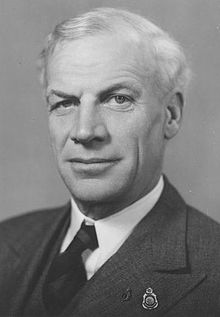Keith Wilson (South Australian politician)
| Sir Keith Wilson | |
|---|---|

Sir Keith Cameron Wilson, 1950
|
|
| Senator for South Australia | |
|
In office 1 July 1938 – 30 June 1944 |
|
| Member of the Australian Parliament for Sturt |
|
|
In office 10 December 1949 – 29 May 1954 |
|
| Preceded by | New seat |
| Succeeded by | Norman Makin |
|
In office 10 December 1955 – 31 October 1966 |
|
| Preceded by | Norman Makin |
| Succeeded by | Ian Wilson |
| Personal details | |
| Born |
3 September 1900 Adelaide, South Australia |
| Died | 28 September 1987 (aged 87) Adelaide, South Australia |
| Nationality | Australian |
| Political party |
United Australia Party (1938–1944) Liberal (1944–1966) |
| Spouse(s) |
Elizabeth Bonython (Lady Elizabeth Wilson CBE) |
| Relations | Sir John Lavington Bonython (Father-in-law) |
| Children | Ian Wilson |
| Occupation | Politician |
| Profession | Lawyer |
Sir Keith Cameron Wilson (3 September 1900 – 28 September 1987) was a lawyer and Australian politician, sitting in both houses of federal parliament.
Born 3 September 1900 in Adelaide, a son of lawyer A. T. K. Wilson (died 15 August 1925) and his wife Lilian (née Laurence), he attended St Peter's Collegiate School, Adelaide, and studied law at the University of Adelaide. His grandfather, C. A. Wilson, and great-grandfather, Thomas Wilson, were also lawyers who practised in South Australia.
In 1930 he married Elizabeth (Betty) Hornabrook Bonython (25 January 1907 – 25 September 2008), born in Adelaide, the eldest daughter of Adelaide Advertiser editor, and Lord mayor of Adelaide, Sir John Lavington Bonython (1875–1960) and his first wife Blanche Ada Bray (1881–1908).
In the Australian federal election, 1934 he was, with J. L. Price, nominated by the Liberal and Country League for the seat of Boothby. Price was the winning candidate.
In the Australian federal election, 1937, Keith was elected a Senator for South Australia for the United Australia Party, serving from 1938 to 1944. In 1940 he joined the army, continuing to serve in the Senate. He was not re-elected in 1943, so when his term ended, he went on active service and became a "Rat of Tobruk", serving with the 2/7th Field Regiment, Royal Australian Artillery, in North Africa, and subsequently in Borneo.
...
Wikipedia
